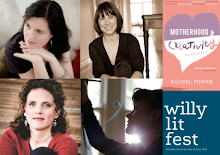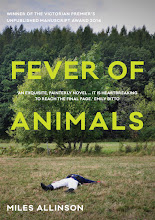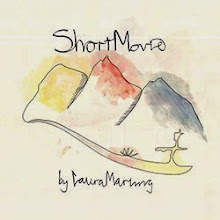 Long time no see! Sorry about that... Thank you to anyone who is still checking in with me or contacting me about The Divided Heart. So much to talk about...
Long time no see! Sorry about that... Thank you to anyone who is still checking in with me or contacting me about The Divided Heart. So much to talk about...
But first, I was recently approached by Harry Bingham, writer and founder of UK-based The Writers' Workshop and The Word Cloud, an online writers' network (which looks like an amazing resource) about doing a blog exchange.
He had come across my initial response to Emma Donoghue's novel, Room, which I'll re-publish below.
Room is one of those books that inspires fierce debate, and how cool is it that we can now have these debates across oceans and time zones and with people we would otherwise have never met. So thanks to Harry for getting in touch. And to my mate Sally Rippin, who always knows which books to lend me just at the right time!
Here's the exchange... as Harry says, "Get stuck in yourself. Tell us why we're wrong. or right. Or anything." On his blog or mine or, even better, both... (Although, I think it's worth saying -- while there isn't any great detail about the plot here, unless you've read the book or at least lots about it, there should be a general *spoiler alert*.)
My initial post:
Have any of you read Emma Donoghue's Room?
The difficulty with talking about this book is that there’s almost no way of doing so without giving away key plot points.
Nevert
 heless, I can say that I can't remember the last time I read a book that had me so gripped, and affected me so physically! At one stage I was reading in the bath and was so utterly compelled to keep reading, the water went completely cold around me and I didn't even notice.
heless, I can say that I can't remember the last time I read a book that had me so gripped, and affected me so physically! At one stage I was reading in the bath and was so utterly compelled to keep reading, the water went completely cold around me and I didn't even notice.
I had some small misgivings — perhaps only to be discussed with those who have also read the book, in the comments, with a 'spoiler alert' — but they didn't take away from its overall impact.
The main reason I am mentioning the book here, though, is because I think it’s a great example of a novel written by someone who has used their access to a child's way of talking and seeing the world as material for writing.
Some of us have more access to our 'child selves' than others — or at least memory of what it was like to be young — and I'm not trying to suggest that you cannot understand or write from a child’s perspective unless you have kids… but it sure does help.
The authenticity of this book's five-year-old narrator's voice — with it's cute grammatical errors and limited perspective — suggests close observation of her children.
I also felt great admiration for the 'Ma' character, who shows such remarkable creativity and discipline in raising and educating her child, under the most horrific and potentially damaging circumstances. And at the same time, this focus and need for routine that he requires has been her saviour.
Admittedly there were moments when I felt frustrated by the five-year-old narrative — not the character himself, who remains loveable throughout (quite a feat in itself), but the way his viewpoint kept you at a distance from the central horrors of the story.
But then I realised that this avoids the sensationalism that its theme could easily have exploited, and that this book is much more about the force of the parent–child bond. It raises all sorts of questions about the nature of freedom and about a child's needs. Also their capacity for fierce love and courage.
Harry's comment:
Well, what a book! More than that, what an audacious concept. To take the true-life Joseph Fritzl story and fictionalise it – what a tasteless, ill-judged act that could have been.
And Donoghue’s Room is not seedy, not exploitative. What's more, Rachel, I think you’re right about the voice. This for example: 'I choose Meltedy Spoon with the white all blobby on his handle when he leaned on the pan of boiling pasta by accident. Ma doesn’t like Meltedy Spoon but he’s my favourite because he’s not the same.'
No question, that’s beautifully done. 'Meltedy', not Melty, or Melted, or even meltedy. And the imprecision of 'the white all blobby' (Jack’s phrase) but the precision of Ma's 'pan of boiling pasta'. The personification of the spoon. But above all that achingly touching phrase, 'because he's not the same'.
And yet, I ended up not liking the book, and here's why. If you take a subject of such darkness to write about it is your responsibility as an author – as a human – to honour the darkness. To follow the logic of your own storyline unflinchingly to where it leads.
But it seems to me (and I want to avoid spoilers) that Room evades every hard question. At the end of the book, everyone's fine. It was a bit weird adjusting, but only a bit. Jack and Ma had some difficult moments, but give them a few weeks and it's all over.
The book seemed like a Disney version of the truth, like wishful thinking. Do we honestly think that a pair who had undergone what Ma and Jack had undergone would not be severely scarred by their ordeal? Of course not. We know that people who suffer much less trauma are permanently injured. Donoghue's faultlessly appealing telling lifts her over and away from the painful question of what is actually being told. I think if you write about Fritzl, you need to deal with Fritzl. Donoghue writes beautifully – and I don’t for a second begrudge her success – but it’s not a book I’d recommend myself.
And finally, my comment on Harry's comment (since he kindly gave me right of reply):
I agree that if Donoghue had been writing a non-fiction book about Fritzl, then she would have had certain clear responsibilities. But surely as a fiction writer, as long as she is not directly harming or exploiting anyone, her main responsibility is to her story; and to fulfilling her own intentions as best she can.
I suspect what compelled Donoghue to write Room was curiosity about how a mother might manage in such extreme circumstances. After all, alongside the more horrific and traumatic elements of these stories is the question of how a person might cope with the boredom and banality of long days in captivity without going mad. For a mother, this would mean the trials of dealing with the day-to-day needs of your children in the most deficient of circumstances.
Like you, Harry, I initially had similar misgivings about Jack's innocent viewpoint keeping us at arm’s length from the true awfulness of his and Ma's circumstances. But I concluded that this was one of the book's main themes: a mother’s instinct to protect, and the limits of her power to do so. For Jack, their world, though at times confusing, was also comforting in its confines; it was all Jack knew. And therein lies the kind of questions I think Donoghue was seeking to explore.
Besides, on the matter of darkness, I don't know if you can get much grimmer than the image of a naive boy hiding in a cupboard and counting the number of times the bed squeaks as his captor–father rapes his young mother.
I agree the book hits some false notes in its second half, particularly the response of Ma's family, which at times seems too casual and careless. And it's true that we don't get a full sense of Ma's suffering, but again I think Donoghue is more interested in looking at the impact of the inevitable disruption to the intensity of the mother–child bond.
There are plenty of other, often much more sensationalist, sources out there if you're looking to rub your nose in the sickening reality of these real-life cases. But Donoghue was perhaps trying for something more poignant with her novel.
I think the fact that we're debating these questions is enough of a reason to recommend Room as a gripping and thought-provoking read.

















5 comments:
Hi! Thanks so much for visiting my silly little blog! I've actually read your latest book, my friend Jodi from Che and Fidel lent it to me! Beautiful work, im a little starstruck now!
Hey, great idea to have blog debates over books! I loved reading both your fabulous insights and fascinating to see that while you both have similar misgivings about the book you both came away with different conclusions. I have to say as a fictitious examination of motherhood - as a 'what if' scenario of the most extreme kind, I was most impressed with where Emma Donaghue went with this story and how artfully she avoided it becoming a sordid voyeuristic tale of an all too recognisable news story. Like Rachel, I gobbled it up almost in one sitting. Having said that, by pure coincidence, soon after I read Lloyd Jones' 'Hand Me Down World', which, in my humble opinion, as an exploration of motherhood coloured by extreme circumstances, pushed Donaghue's book swiftly into the shadows. Love to hear your thoughts on that one!
Interestingly I have just read this fascinating conversation between critic Kerry Clare and author Marita Daschel: http://www.picklemethis.com/2010/11/23/talking-in-circles-and-coming-full-circle-talking-about-talking-about-motherhood/
It's a long interview, which I will talk about more in a future post, but in relation to 'Room', Daschel says:
'What was remarkable about Room to me was not how “right” Donoghue got my experience, but that she’d actually managed to articulate aspects of my experience I hadn’t before been conscious of – which is really incredible. I’m at home all day alone with Harriet, and I remember as I was reading that everything I said and did was taking on a new resonance. I had never realized (perhaps because Harriet is still so young) how much a mother constructs her child’s universe in the various real-world Rooms in which they find themselves – the womb, the empty house alone all day.
I think if Donoghue hadn’t been a mother though, Room would have had a different kind of emphasis. I recently read James Woods’ review of the novel in the LRB, and he wrote about its lightness, its readability, the cutesy focus on Jack – and how the actual story that inspired the novel would not have such a rosy tinge. Because of her focus on the mother-child bond, Donoghue was able side-step a horror story, the fact that an actual mother probably would not construct such a fair and happy world for her child, would have neither the tools nor the capacity to do so. Room is a fairy-tale, really. Perhaps as a mother Donoghue was unable to look the real situation in the face (and I can’t blame her). Her story is a hypothetical one rather than a particular one, and there is safety in that.'
I read this all with great interest. I think my feelings are quite similar in general, although I might take my disappointment with the 2nd half a wee bit further. I felt quite...ripped off is not quite the right phrase, but shortchanged when Harriet is silenced by her breakdown/depression. It was understandable, yes, plausible, but I think up until then I'd put her on a pedestal for being so brave and audacious for planning the escape that I expected to her to carry on in a 'superwoman' way - which is hardly fair on my part.
What you said here, Rachel, "I had never realized (perhaps because Harriet is still so young) how much a mother constructs her child’s universe in the various real-world Rooms in which they find themselves – the womb, the empty house alone all day." is really interesting and I think you've got a good point there.
Sally has made me want to get my hands on 'Hand me Down' - I've been meaning to get it for AGES, now I really want to!
The best in literature hits us, changes us and makes us look at the world in a different way while leaving imprints that always linger. Room is such a work.
Marlene
Customer recommendations for Seattle SEO
Post a Comment